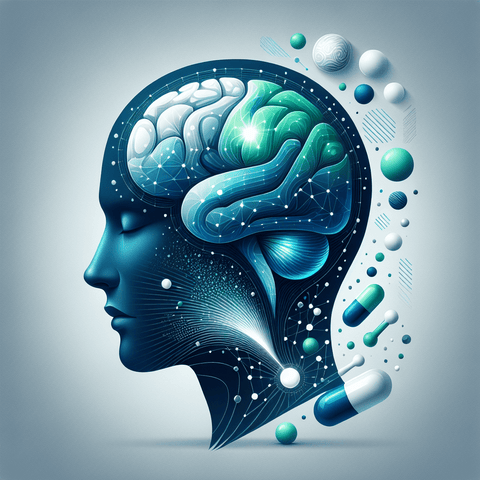Introduction
In an era characterized by relentless mental demands and a growing awareness of health and wellness, maintaining optimal brain health has become more crucial than ever. Cognitive functions such as memory, focus, learning, and mental clarity are central to personal and professional success, mental well-being, and overall quality of life. As we age or face various health challenges, these cognitive faculties can decline, leading to frustration and diminished productivity.
Interest in nutritional supplements as a means to boost brainpower has surged significantly. People are exploring natural ways to sharpen their minds, improve their concentration, and combat cognitive decline. Among the many nutrients touted for brain health, Vitamin B12 has emerged as a key player due to its profound effects on neurological function.
This comprehensive guide aims to explore how Vitamin B12 supplementation can be a game-changer for your mental performance. We will unravel the science behind B12’s role in brain health, discuss how to recognize deficiency symptoms, and provide practical advice on optimizing B12 intake for a sharper, healthier mind. Whether you’re seeking to improve memory, reduce mental fatigue, or protect against age-related neurological decline, understanding the power of Vitamin B12 can unlock the secrets to boosting your brain’s potential.
1. Understanding Vitamin B12: The Essential Nutrient for Brain and Body
Vitamin B12, also known as cobalamin, is a water-soluble vitamin that plays an indispensable role in maintaining various physiological processes. It is crucial for the synthesis of DNA, red blood cell formation, and proper neurological function. Unlike many nutrients that the body can produce, Vitamin B12 must be obtained through dietary sources or supplementation because humans cannot synthesize it naturally.
In the body, Vitamin B12 is involved in methylation reactions—biochemical processes that influence DNA repair, gene expression, and neurotransmitter synthesis. These reactions are vital for maintaining neuronal integrity and ensuring proper cognitive functioning. A deficiency can lead to a range of health issues, from anemia and fatigue to severe neurological and psychiatric disorders.
Sources of Vitamin B12 are primarily found in animal products such as meat, eggs, dairy, and fish. For individuals with dietary restrictions, like vegans, or those with absorption issues, supplementation becomes necessary. Natural sources include shellfish, liver, and fortified foods. Supplement options are available in various forms, including pills, sublingual tablets, and injections.
Adequate B12 levels are fundamental for overall health, but their importance is especially pronounced in supporting neurological health and cognitive function. Without sufficient B12, the risk of neurological symptoms such as numbness, tingling, balance problems, and cognitive disturbances increases markedly.
Common signs of B12 deficiency include fatigue, weakness, pale skin, difficulty walking, cognitive disturbances like memory loss, mood changes, and even depression. Because B12 deficiency can be subtle or develop gradually, it’s often overlooked but can have long-term impacts on cognitive health. Researchers have linked insufficient B12 to increased risk for neurodegenerative diseases such as dementia and Alzheimer’s, highlighting its crucial role in brain maintenance.
2. Cognitive Enhancement with Vitamin B12: Unlocking Your Brain’s Full Potential
Cognitive functions—such as memory, concentration, problem-solving, and overall mental agility—depend heavily on optimal neurological functioning. Vitamin B12 has a vital role in supporting these processes through its involvement in nerve health, neurotransmitter synthesis, and energy production in brain cells.
Several recent scientific studies have demonstrated a positive association between B12 levels and cognitive performance. For instance, research indicates that maintaining adequate B12 status can help improve memory recall and learning capacity, particularly in populations at risk of deficiency, such as older adults. Supplementing with B12 has shown promise in improving cognitive scores and mental sharpness, especially in individuals experiencing early signs of cognitive decline.
Mental fatigue—a common complaint in today’s high-stress environments—also correlates with low B12 levels. It hampers concentration, slows thinking, and diminishes motivation, affecting both professional productivity and daily life. B12’s essential role in energy metabolism within brain cells makes it an effective nutrient for combating mental exhaustion.
Practically, enhancing cognitive function through B12 involves ensuring regular intake via diet and supplementation. For those already deficient, restoring optimal B12 levels can result in notable improvements in mental clarity and focus. Strategies include consuming B12-rich foods and supplementing with appropriate doses to maintain or elevate B12 levels, particularly during periods of intense mental work or aging.
3. Neurological Support and Neuroprotective Benefits of Vitamin B12
The nervous system—the complex network of neurons transmitting signals throughout our bodies—depends heavily on B12 for proper functioning. This vitamin supports nerve health by maintaining the integrity of the myelin sheath, a protective covering surrounding nerve fibers essential for rapid and efficient nerve signal transmission.
Myelin, often compared to insulation on electrical wires, ensures that nerve impulses reach their intended destinations swiftly and accurately. B12 plays a critical role in synthesizing and maintaining this sheath, preventing nerve degeneration, and facilitating communication between neurons. When B12 levels are insufficient, myelin formation is impaired, leading to neurological symptoms and cognitive issues.
Research has shown that inadequate B12 can accelerate age-related neurological decline. Evidence suggests that supplementation can slow progression and, in some cases, reverse early neurodegenerative changes by supporting nerve regeneration and repair mechanisms.
In addition, B12’s neuroprotective effects are relevant in the context of neurological disorders such as peripheral neuropathy, multiple sclerosis, and even Alzheimer’s disease. Although more research is needed to determine causality, existing studies highlight B12's potential role in neurobiology and preservation of cognitive health as we age.
The neuroprotective properties of B12 emphasize its importance not only in maintaining baseline brain health but also in defending against future neurological damage. Ensuring sufficient B12 intake can support lifelong nerve health, help prevent cognitive decline, and contribute to a resilient nervous system.
4. B12 Deficiency Relief: Addressing a Common Yet Overlooked Problem
Despite the importance of Vitamin B12, deficiency remains widespread, especially among certain populations. Vegans and vegetarians are at high risk because B12 predominantly resides in animal products. Older adults may experience absorption difficulties due to decreased gastric acid production, while individuals with gastrointestinal disorders like celiac or Crohn’s disease also face challenges in B12 uptake.
Recognizing the symptoms of deficiency is crucial. Practical signs include persistent fatigue, cognitive lapses, mood swings, and neurological manifestations such as numbness or balance problems. Often, these symptoms are dismissed or attributed to other causes, delaying diagnosis and intervention.
B12 deficiency can severely impair brain function over time, increasing the likelihood of memory problems, depression, and cognitive decline. Supplementation—whether through oral pills, sublingual tablets, or injections—is an effective way to restore B12 levels, especially when deficiency is confirmed through blood tests.
By addressing B12 deficiency early, individuals can experience significant improvements in mental clarity, energy, and overall neurological health. Regular monitoring and adjusting intake as needed, under healthcare guidance, ensure sustained benefits.
5. Enhancing Mental Clarity and Focus Through Vitamin B12 Supplementation
In our fast-paced world, mental clarity and focus are essential for productivity and well-being. Low B12 levels can contribute to brain fog—a state of mental confusion, sluggishness, and reduced concentration. Conversely, sufficient B12 supports the biochemical pathways necessary for clear and sharp thinking.
B12’s role in methylation affects neurotransmitter synthesis, such as serotonin and dopamine—chemical messengers that influence mood, motivation, and focus. Adequate B12 levels can thus help reduce brain fog, elevate mood, and enhance mental agility.
To optimize B12 intake for daily mental sharpness, consider incorporating B12-rich foods or supplements into your routine. Substantial doses—within recommended limits—ensure rapid absorption and effective functioning. Combining B12 with lifestyle habits like regular physical activity, adequate sleep, and mental exercises can amplify cognitive benefits.
Some individuals use complementary nootropics or adaptogenic herbs alongside B12 for a synergistic effect, boosting overall brain resilience. However, the foundation remains ensuring optimal B12 status, especially in cases of deficiency or aging-related decline.
6. Choosing the Right Vitamin B12 Supplement: Types, Doses, and Quality
The market offers various forms of B12 supplements, each with unique properties and suitability depending on individual needs. Methylcobalamin, the body's active form, is often preferred for neurological support and absorption efficiency. Other types include hydroxocobalamin and cyanocobalamin, which are also effective but may differ in bioavailability or suitability for certain populations.
For cognitive and neurological benefits, typical doses range from 500 micrograms to 2,000 micrograms daily, but individual needs vary based on deficiency status, age, and health conditions. Consulting a healthcare provider helps determine the most appropriate dosage and form.
Choosing high-quality supplements is vital. Look for reputable brands that adhere to strict manufacturing standards and transparency about ingredient sourcing. Certifications from reputable quality assurance programs ensure safety and potency.
Before starting any supplement regimen, especially at high doses, it's essential to seek medical advice. Blood tests can verify B12 levels and guide dosing strategies to avoid excess intake and ensure safety.
7. Integrating Vitamin B12 into a Holistic Brain Health Strategy
While B12 supplementation offers significant benefits, it works best as part of a comprehensive approach to brain health. A balanced diet rich in diverse nutrients—such as omega-3 fatty acids, antioxidants, and vitamins—supports optimal brain function. Incorporating foods rich in Omega-3 fatty acids, like fish or [DHA & EPA Omega-3 Supplements](https://www.topvitamine.com/collections/dha-epa-omega-3-supplements), enhances neuronal membranes and promotes healthy cognitive processes.
Regular physical exercise boosts blood flow to the brain, stimulates neurogenesis, and improves mood and attention. Mental exercises—such as puzzles, meditation, and continuous learning—keep the brain engaged and resilient. Lifestyle factors like adequate sleep, stress management, and avoiding toxins further optimize brain health.
Monitoring B12 levels periodically, especially if you are at risk for deficiency, allows you to tailor your intake and maintain optimal levels over the long term. Consistent supplementation combined with healthy lifestyle habits yields the best outcomes in preserving and enhancing cognitive function.
Conclusion
Vitamin B12 is a cornerstone nutrient for maintaining and enhancing cognitive and neurological health. Its role goes beyond basic bodily functions, extending into supporting memory, focus, mental clarity, and nerve integrity. As we age or encounter health challenges, our B12 requirements may increase, making supplementation an invaluable tool in our wellness arsenal.
Incorporating B12 into your daily routine—via diet or high-quality supplements—can unlock your brain’s full potential. Remember to consult healthcare professionals to determine the appropriate type and dose, ensuring safe and effective use. With consistent effort and strategic supplementation, a sharper, healthier mind is within reach.
Start your journey today—choose the right B12 supplement, embrace a holistic approach, and unlock the secret to lifelong cognitive vitality.
Q&A Section
Q1: How does Vitamin B12 help improve brain function?
A1: Vitamin B12 supports brain function by aiding in methylation processes critical for neurotransmitter synthesis, maintaining nerve myelin sheaths, and facilitating energy production within brain cells. These mechanisms contribute to better memory, focus, and mental clarity.
Q2: Who is most at risk of B12 deficiency?
A2: Vegans, vegetarians, older adults, and individuals with gastrointestinal disorders such as celiac or Crohn’s disease are at higher risk of B12 deficiency due to dietary restrictions or absorption issues.
Q3: What are the best forms of B12 supplements for cognitive health?
A3: Methylcobalamin is often preferred for neurological support because it is the active form directly usable by the body. However, other forms like hydroxocobalamin are also effective. It is best to consult with a healthcare provider to choose the right type.
Q4: How can I incorporate B12 into my daily routine?
A4: Consume B12-rich foods like fish, eggs, and dairy, or take supplements such as tablets or sublingual B12. Combining B12 intake with healthy lifestyle habits, including exercise and mental stimulation, maximizes cognitive benefits.
Q5: Are there any safety concerns with B12 supplementation?
A5: Vitamin B12 has a low toxicity profile, and excess amounts are usually excreted. However, it’s advisable to follow recommended doses and seek medical guidance, especially if using high doses or injections, to ensure safety.
Important Keywords
- Vitamin B12
- Cognitive function
- Brain health
- Memory improvement
- Neuroprotection
- B12 deficiency
- Neurodegenerative diseases
- B12 supplements
- Neurological support
- B12 sources
- Supplementation benefits
- Brain fog
- Methylcobalamin
- Holistic brain health



